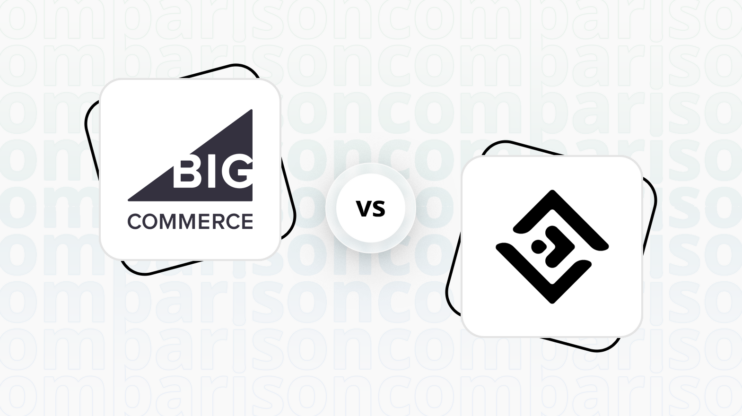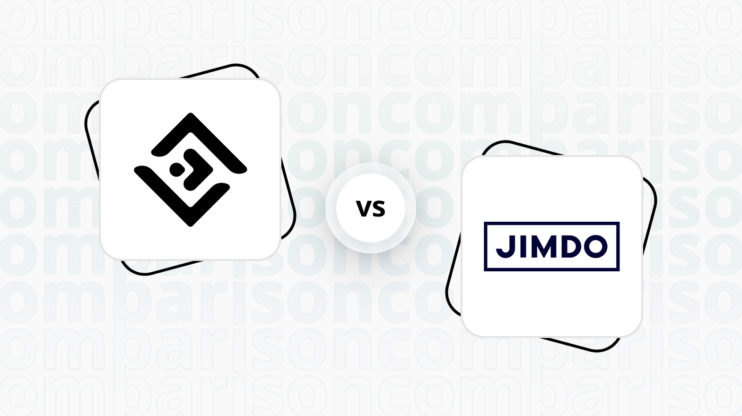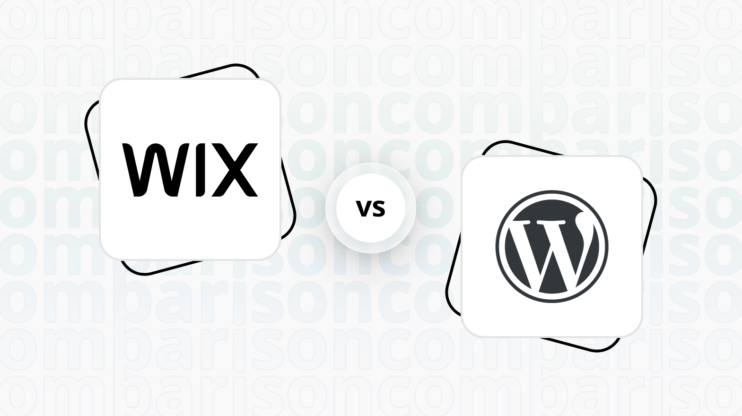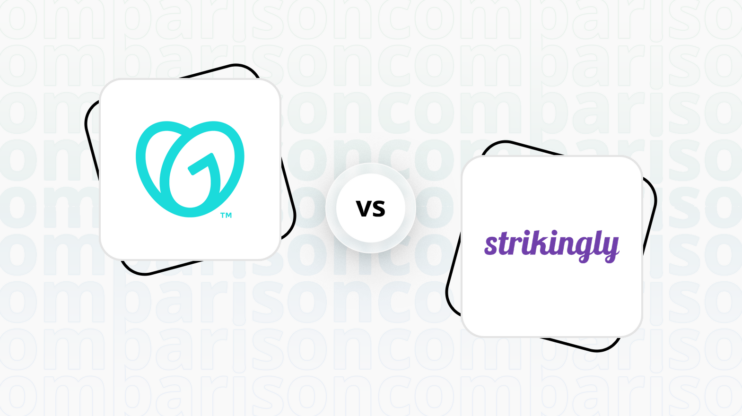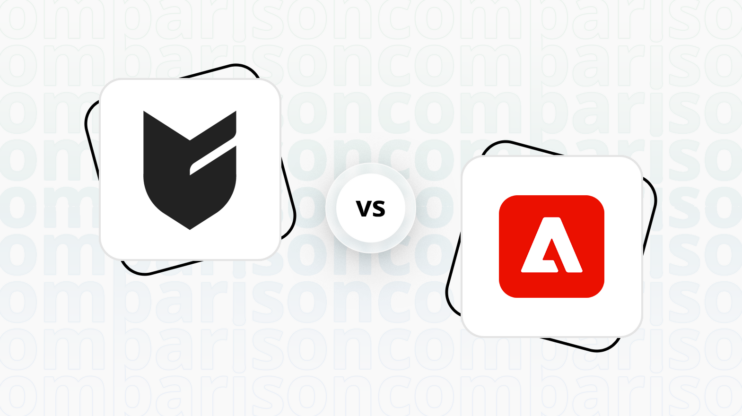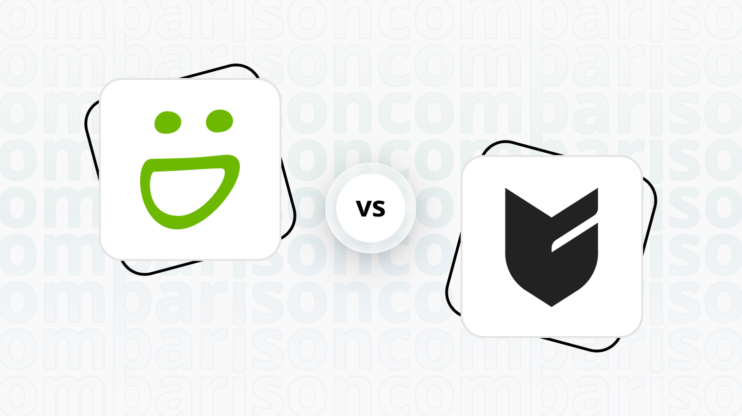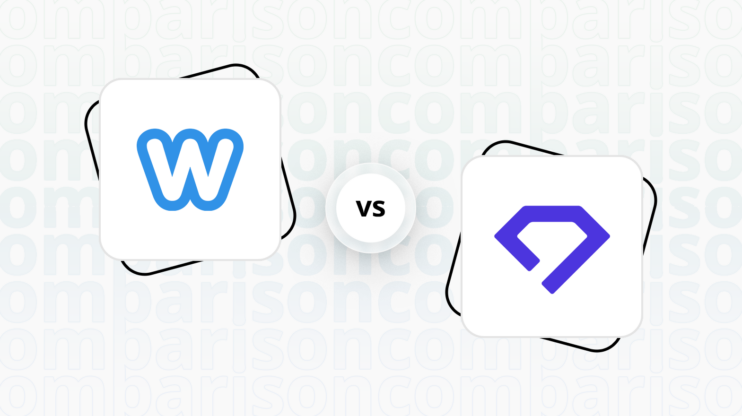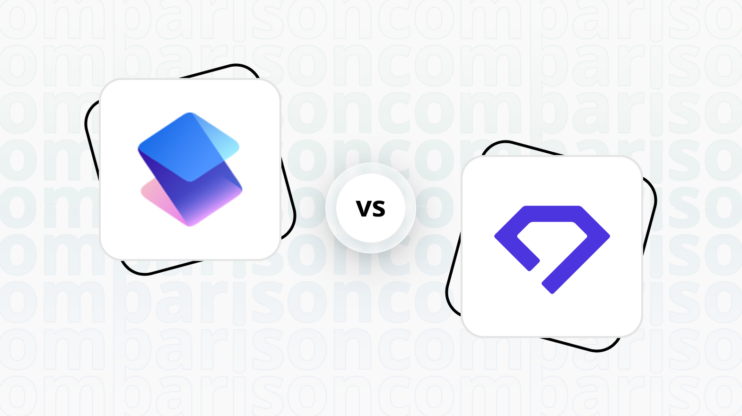Final verdict
Between BigCommerce and Jimdo, each platform serves distinct user needs with its own set of strengths.
-
BigCommerce (Overall Grade: 7.9/10)
excels as a comprehensive ecommerce solution, offering a wide range of customizable templates, advanced SEO tools, and extensive support resources. It’s particularly suited for businesses looking to scale their online presence with robust ecommerce features, including multi-channel selling and various payment gateway integrations. Despite its learning curve, BigCommerce provides valuable resources to help users maximize the platform’s capabilities. -
Jimdo (Overall Grade: 7.2/10)
stands out for its simplicity and user-friendliness, making it an excellent choice for individuals and small businesses seeking to establish an online presence with minimal effort. While it may not offer the same depth of ecommerce features as BigCommerce, Jimdo’s ease of use and no-code editor appeal to users who prioritize quick website development and basic site management.

|

|
|
|---|---|---|
|
Design functionalities & templates |
7.8 |
7.2 |
|
Ease of use |
7.3 |
8.0 |
|
Ecommerce |
9.0 |
7.0 |
|
Website Editors |
7.9 |
7.8 |
|
Product testing options |
7.3 |
6.4 |
|
Price |
7.4 |
7.5 |
|
Hosting quality |
7.8 |
6.7 |
|
Website speed optimization |
7.6 |
7.6 |
|
Plugins and integrations |
7.7 |
7.4 |
|
Marketing features |
7.9 |
7.2 |
|
Customer support |
8.7 |
6.8 |
|
Security |
8.9 |
8.3 |
|
AI capabilities |
7.3 |
6.0 |
|
User Management |
8.9 |
5.8 |
| Overall |
7.9 |
7.2 |
Best for ecommerce
 9.0
9.0
 7.0
7.0
Verdict
: For businesses aiming for growth and needing comprehensive ecommerce capabilities, BigCommerce is the superior choice. Jimdo offers a simpler, more user-friendly approach suitable for smaller operations.
-
BigCommerce
: With its robust ecommerce features, including unlimited products, advanced SEO tools, and multi-channel selling, BigCommerce is designed for businesses looking to expand their online presence. Its wide range of customizable templates and design options cater to various industries, making it a versatile choice for merchants. -
Jimdo
: Ideal for individuals and small businesses, Jimdo simplifies the ecommerce process with its user-friendly platform. It offers basic ecommerce functionalities like inventory tracking and discount codes, making it a good starting point for those new to online selling.
Best for informational & business websites
 7.5
7.5
 7.4
7.4
Verdict
: With nearly identical scores in this category, both BigCommerce and Jimdo offer compelling features for informational and business websites. However, BigCommerce’s slight edge in score and its robust e-commerce features make it a slightly better choice for businesses looking to scale online.
-
BigCommerce
: Offers a comprehensive suite of tools that cater well to business websites, especially those looking to incorporate e-commerce elements. Its wide range of customizable templates and built-in features support a professional online presence. -
Jimdo
: Stands out for its simplicity and ease of use, making it an excellent choice for small businesses and individuals looking to create straightforward informational websites. Its user-friendly approach is ideal for those with limited technical skills or resources.
Detailed comparison
Design functionalities & templates
Design FunctionalitiesRepresents how well each platform allows for creative design and customization of websites.Score Components:
- Template Variety (30%): Range and quality of design templates.
- Customization (30%): Flexibility and options for design alterations.
- User Interface (20%): Ease and intuitiveness of the design process.
- Responsiveness (10%): Adaptability to different devices and screen sizes.
- Innovation (10%): Unique design features and tools.
 7.8
7.8
 7.2
7.2
🏆
Winner: BigCommerce.
If you’re looking for a platform that offers more creative control and a wide array of design features, BigCommerce is the preferred choice.
BigCommerce offers a variety of design templates for creating ecommerce websites, with a total of 240 themes available. Most of these themes come with up to four styling options, providing users with flexibility in design choices to match their brand’s aesthetic. There are 12 free themes, while the rest range in price from $150 to $300 each.
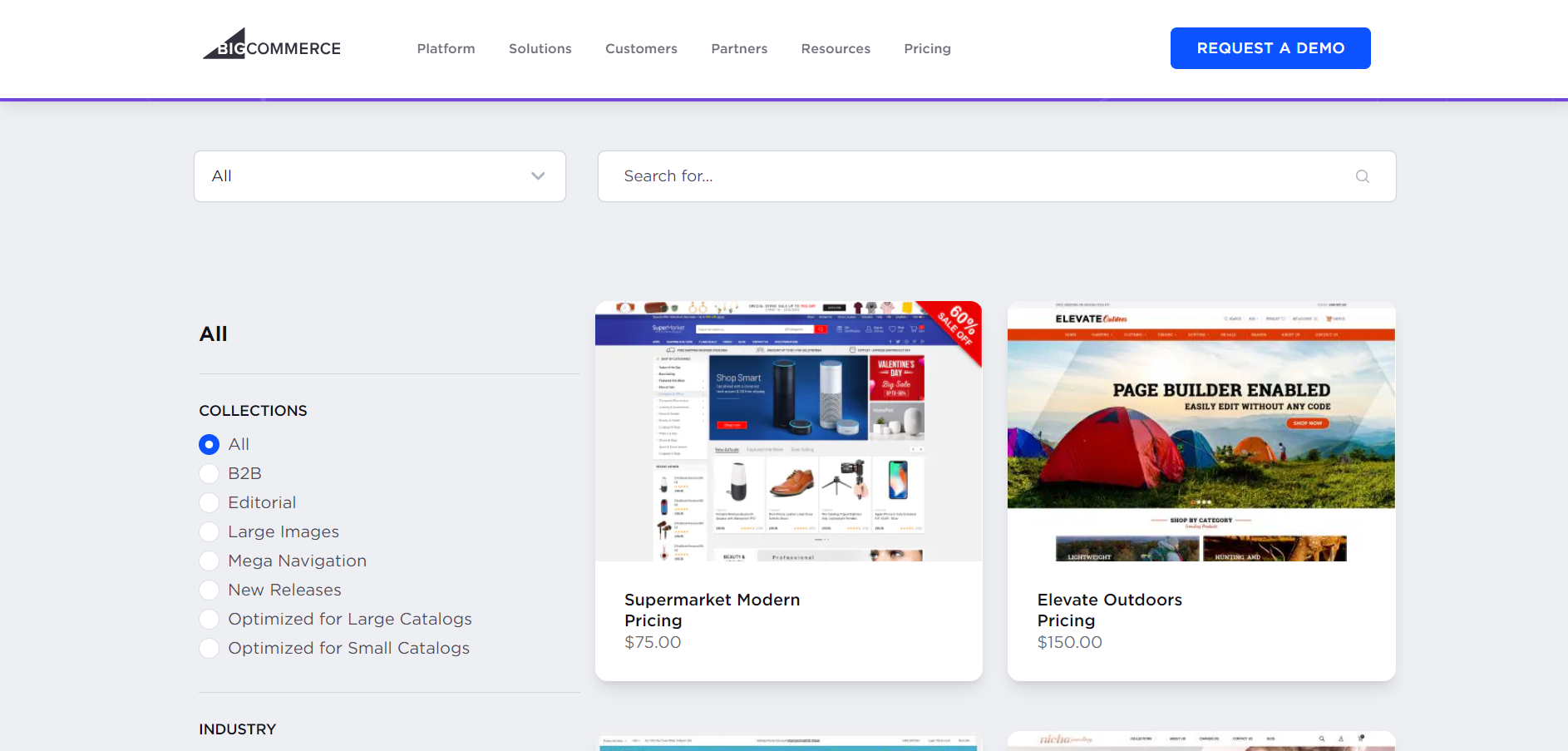
Compared to BigCommerce, Jimdo offers a diverse range of templates suitable for various industries and user preferences, with options to preview and select templates easily. The platform allows flexibility in changing templates for existing websites and also provides a “Blank Template” for custom designs, catering to both beginners and advanced users.


Get a head start on website creation with AI
Create a custom website tailored to your business needs 10X faster with 10Web AI Website Builder!
Ease of use
Ease of useReflects the platform’s overall user-friendliness.Score
Components:
- Learning curve (40%): Quickness and ease of getting started.
- Interface design (30%): Simplicity and intuitiveness of layout.
- User guidance (20%): Quality of tutorials and support.
- Flexibility (10%): Adaptability to various user skills.
 7.3
7.3
 8.0
8.0
🏆 Winner: Jimdo
. With a score of 8.0, Jimdo is praised for its simplicity and user-friendliness, especially for beginners. BigCommerce, scoring 7.3, offers a robust platform but may be overwhelming for beginners or small businesses on a tight budget. If ease of use is a priority, Jimdo is the clear winner in this category.
Learning Resources
🏆 Winner: BigCommerce
. Both platforms offer solid learning resources, but BigCommerce goes a step further with its wide array of detailed tutorials and active community forums, making it easier for users to learn and adapt.
For ecommerce
EcommerceMeasures the platform’s effectiveness in supporting online business activities.Score Components:
- Ecommerce themes and templates (20%): Variety and design of templates.
- Product management (25%): Ease of managing and organizing products.
- Payment options (25%): Variety and convenience of payment methods.
- Ecommerce features (20%): Features for managing an ecommerce store.
- Integration (10%): Compatibility with external e-commerce tools and services.
 9.0
9.0
 7.0
7.0
BigCommerce is a comprehensive ecommerce platform known for its robust set of built-in features, including advanced SEO tools, various payment gateway integrations, and multi-channel selling capabilities. On the other hand, Jimdo is a user-friendly website builder platform designed for a wide range of users, from individuals creating personal blogs or portfolios to small businesses and ecommerce entrepreneurs.

|

|
|
|---|---|---|
|
Ecommerce themes and templates |
8.0 |
6.5 |
|
Product page customization |
8.3 |
6.8 |
|
Payment processing and commissions |
9.2 |
7.5 |
|
POS capabilities |
8.5 |
5.0 |
|
Payment gateways |
9.0 |
7.0 |
|
Product numbers |
9.5 |
6.0 |
|
Additional ecommerce features |
8.4 |
6.5 |
BigCommerce ecommerce features:
- Unlimited Products
- Streamlined Single-Page Checkout
- Order Management
- Abandoned Cart Recovery
- Marketing and Sales Tools
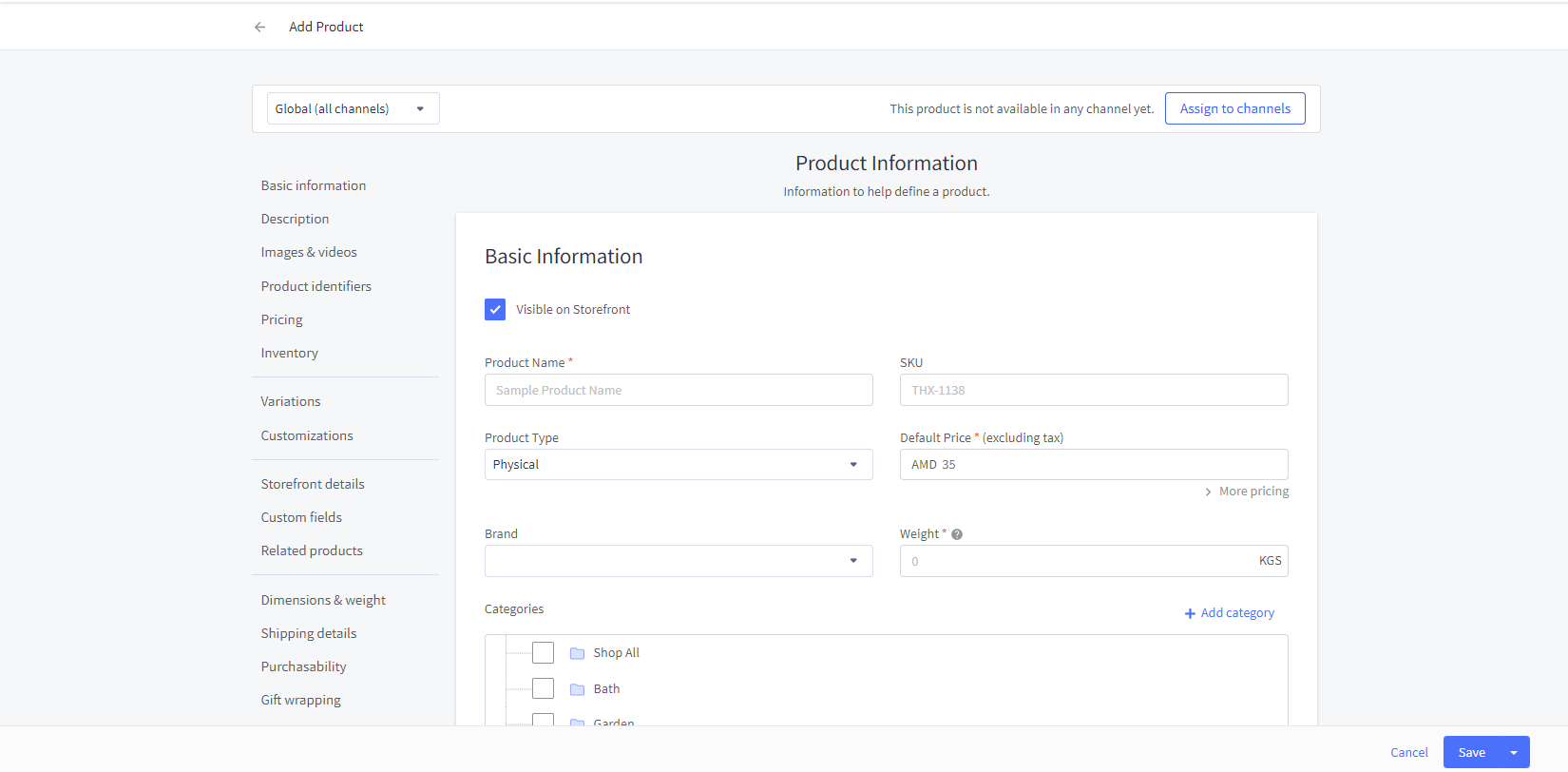
Jimdo ecommerce features:
- Product details and variations
- Inventory tracking
- No transaction fees
- Discount codes and promotions
- Email marketing
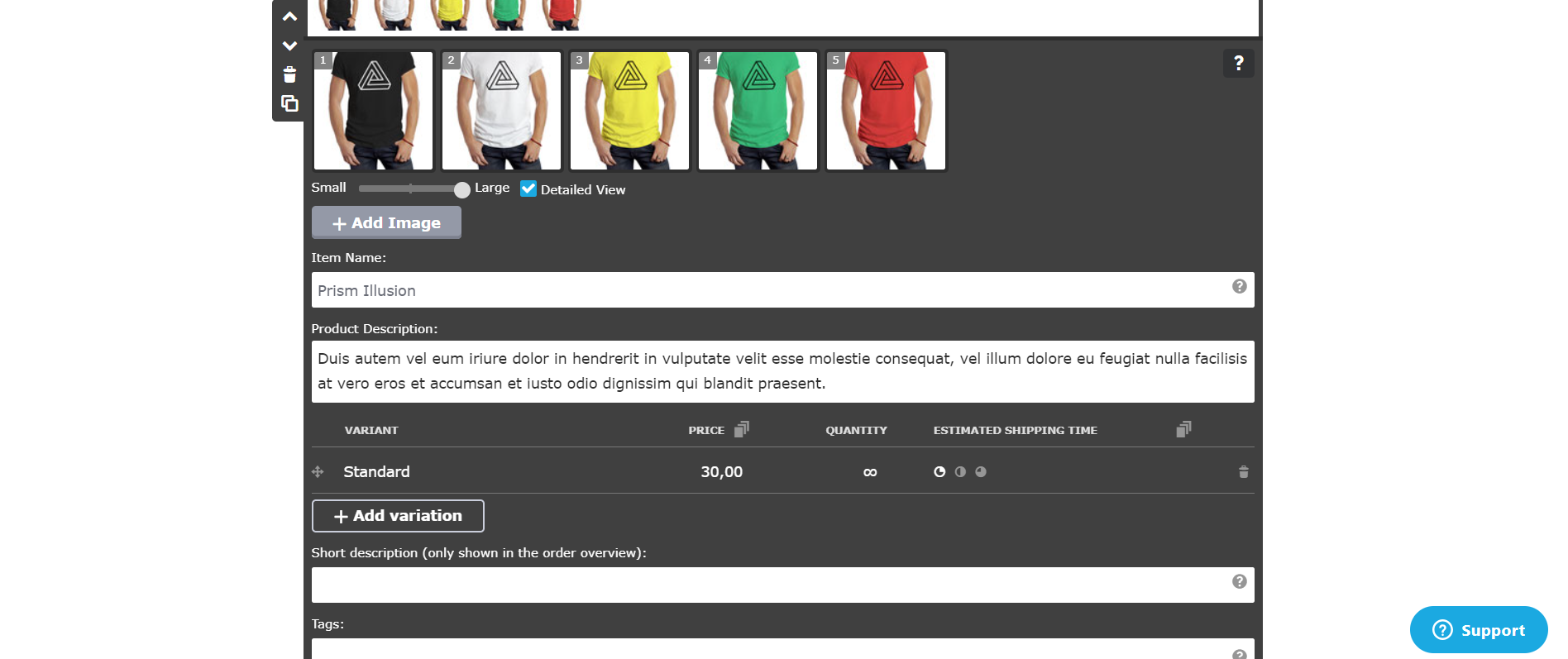
Ecommerce themes & templates
BigCommerce provides a wide variety of eCommerce templates designed to enhance online shopping experiences and cater to different industries. These templates feature advanced functionalities like quick view, product suggestions, and complex search filters but may require performance optimization for maintaining speed. The selection ranges from free to premium options, ensuring businesses can find a suitable design that aligns with their brand and product offerings.
On the other hand, Jimdo’s ecommerce templates offer a diverse range of pre-designed themes, ensuring a mobile-friendly and smooth shopping experience. The drag-and-drop interface allows for easy customization of colors, fonts, and layouts, while templates focus on showcasing products with dedicated sections for images, descriptions, and clear calls to action.
Product page customization
In BigCommerce, you can extensively customize product pages to enhance customer experience and improve sales. This includes the ability to create detailed product variants, customize options like custom fields, and upload multiple images or videos for each product.
Customizing a product page on Jimdo involves using its user-friendly interface to personalize various elements. You can edit text, add images, adjust layouts, and modify design elements like colors and fonts to showcase your products effectively. This customization enhances the visual appeal and functionality of your online store, aiming to improve user experience and boost sales.
Payment processing
BigCommerce supports over 65 pre-integrated online payment solutions, serving customers across 230 countries with more than 140 currencies, without charging additional transaction fees for using third-party payment gateways. This approach provides merchants with the flexibility to choose the best payment solution for their business needs, including the option for custom integration to cater to specific regional payment preferences.
Jimdo facilitates payment processing through various popular gateways like PayPal, Stripe, Mollie, and more, depending on your location and plan. While Jimdo doesn’t impose transaction fees, individual payment gateways may have their own charges, typically ranging from 2% to 3% of the transaction amount plus a fixed fee. Additionally, certain Jimdo plans may offer free transactions per month, providing flexibility for users based on their plan details.
Website Editors
Website EditorsEvaluates the platforms’ website building and editing capabilities.Score Components:
- Customization tools (40%): Range and power of editing features.
- Editor usability (30%): User experience within the editor.
- Design flexibility (20%): Freedom in layout and design changes.
- Update and maintenance ease (10%): Simplicity of updating and maintaining the site.
 7.9
7.9
 7.8
7.8
🏆
Winner: BigCommerce
. BigCommerce, with a score of 7.9, offers an extensive set of tools designed for creating professional and engaging online stores without requiring coding knowledge. It provides a user-friendly drag-and-drop interface, robust eCommerce capabilities including product management and secure payment processing, and customizable templates to match brand aesthetics. The platform also features powerful SEO and marketing tools, app integrations for extended functionality, and comprehensive analytics to track website performance.
Jimdo’s editor, scoring 7.8, is designed to accommodate both novice and experienced users through its two main modes: Jimdo Dolphin and Jimdo Creator. Dolphin, an AI-driven tool, is ideal for beginners and creates websites based on user responses to a series of questions, streamlining the web design process. On the other hand, Jimdo Creator provides a more traditional website building experience with greater customization options, including a drag-and-drop editor and HTML widgets, catering to users seeking more control over their site’s design.
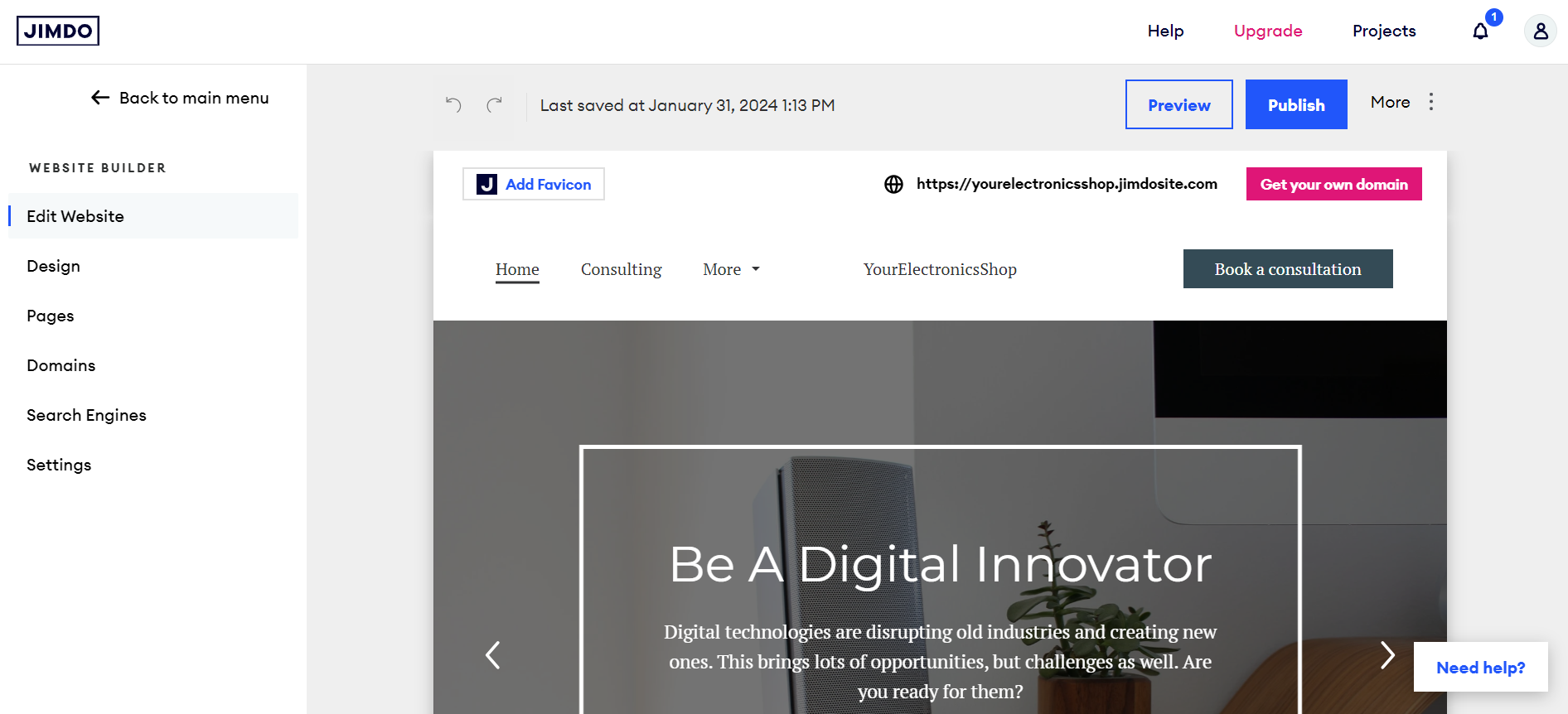
Mobile editor/app
 7.5
7.5
 8.0
8.0
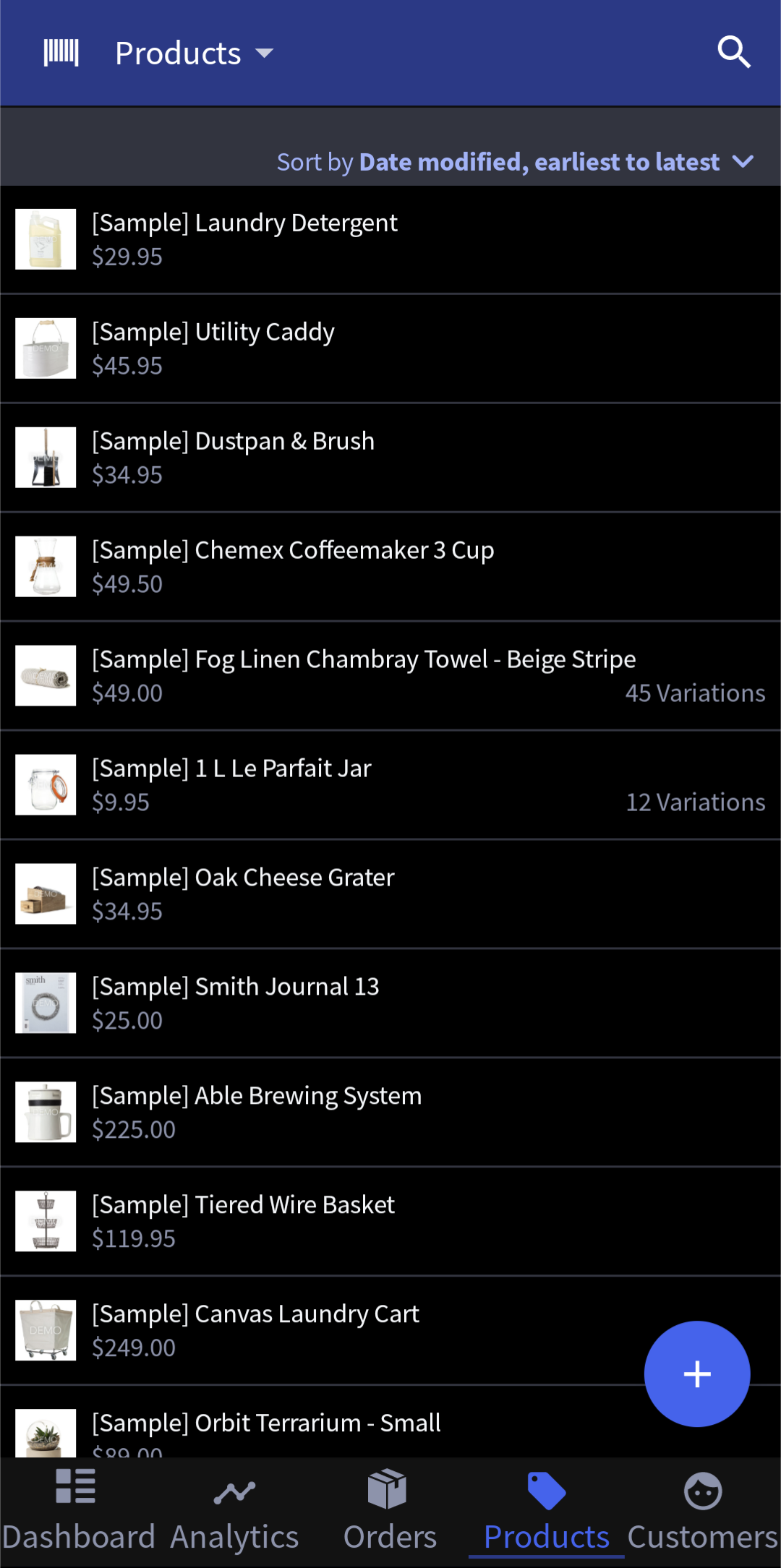
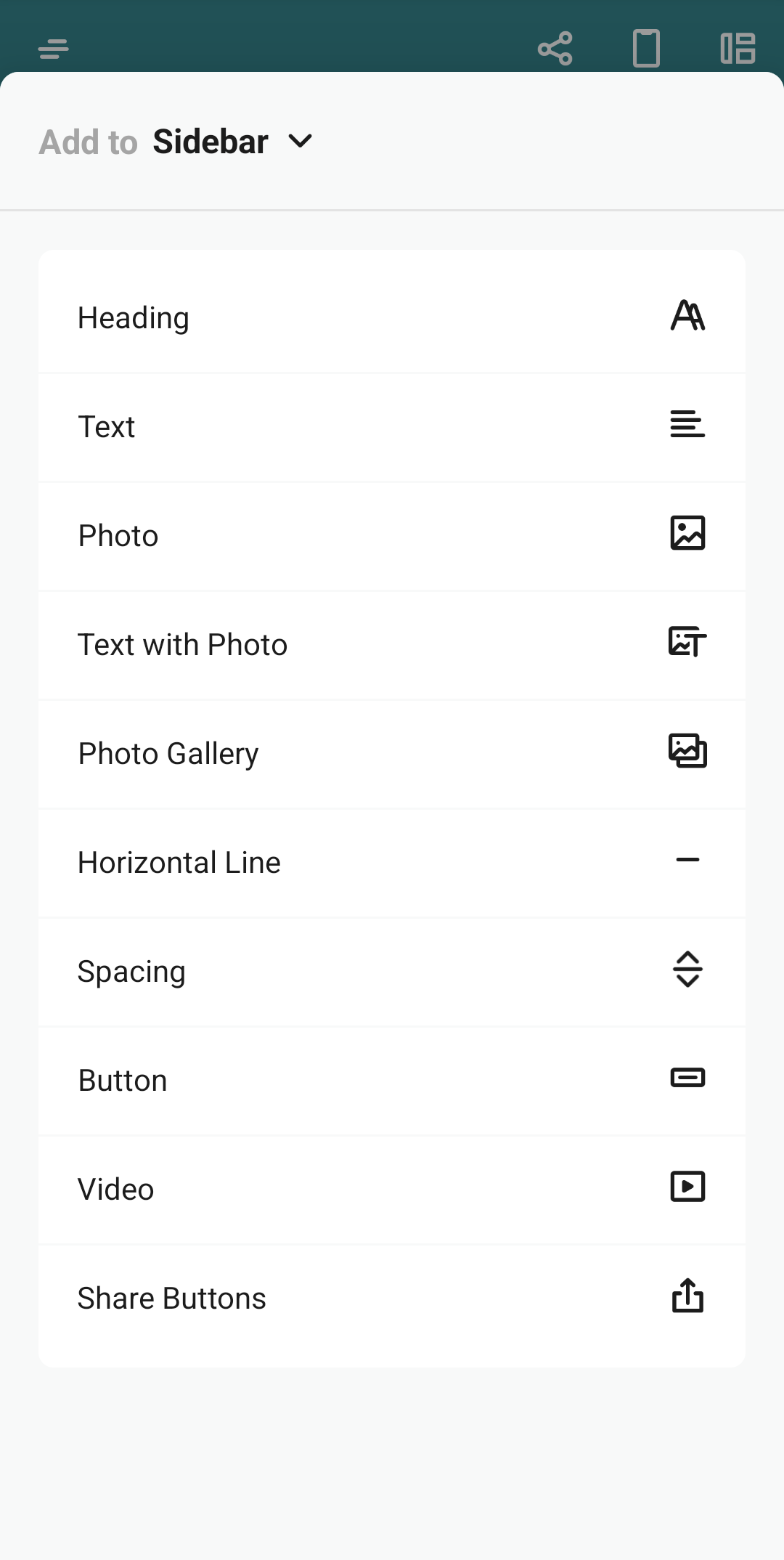
🏆
Winner: Jimdo
. Both BigCommerce and Jimdo offer mobile apps for managing your website, but they cater to different needs. BigCommerce’s mobile app does not allow website editing, focusing instead on providing access to the dashboard, analytics, orders, and the ability to add or edit products.
Jimdo, on the other hand, offers a mobile editor app, allowing users to create and manage their websites directly from their smartphones or tablets. This app provides a convenient way to edit and update your site on the go, including adding or modifying content, adjusting design elements, and managing your online store.
In summary, Jimdo receives a higher rating due to its comprehensive mobile editing capabilities, while BigCommerce’s mobile app is more focused on ecommerce management.
Product testing options
Product Testing OptionsAssesses the options for trying out platform features before commitment.Score Components:
- Trial quality (40%): Extent and usefulness of the trial or free version.
- Feature accessibility (30%): How many features are available to test.
- Trial duration (20%): Length of the trial period.
- Ease of transition (10%): Smoothness of moving from trial to paid plans.
 7.3
7.3
 6.4
6.4
Overall Result
:
BigCommerce wins
with a score of 7.3 against Jimdo’s 6.4. BigCommerce offers a 14-day free trial during which users can test all premium features. However, it does not offer a money-back guarantee. On the other hand, Jimdo offers a free version with basic features and a 14-day money-back guarantee for all paid plans, allowing users to test more advanced options.

|

|
|
|---|---|---|
|
Free Plan |
No |
Yes |
|
Trial Duration |
14 days | No, however they have 14 days money back guarantee |
|
Testing Premium Features |
Possible during free trial |
Available with paid plans |
|
Money Back Guarantee |
No |
14-day for all paid plans |
Price
PriceLooks at the cost-effectiveness and value for money of each platform.Score Components:
- Plan value (40%): What each pricing tier offers.
- Transparency and clarity (30%): Clearness of pricing structures.
- Flexibility of plans (20%): Range of options to suit different budgets.
- Hidden costs (10%): Additional expenses not included in the plan.
 7.4
7.4
 7.5
7.5
BigCommerce and Jimdo have similar price scores, but their offerings differ significantly. BigCommerce is more suited for large-scale businesses with its robust set of features and customizable enterprise plans, while Jimdo offers more affordable options for smaller projects and businesses just starting out.

|

|
|
|---|---|---|
|
Free |
No offering at this amount. |
Play ($0/month): Basic, entry-level plan offering limited features, ideal for testing Jimdo’s capabilities. Includes 500MB storage and up to 5 website pages. Limited ecommerce functionality. |
|
$0-$10 |
No offering at this amount. |
Start ($9/month): Aimed at small projects or businesses just starting out. Provides 5GB of storage and up to 10 website pages, along with SEO tools for online visibility. Not directly focused on ecommerce. Value for price: 6.0 |
|
$10-$15 |
No offering at this amount. |
Grow ($15/month): Targets growing businesses needing more space and features. Offers more flexibility but still lacks dedicated ecommerce capabilities compared to the Business plan. Provides 20GB bandwidth with up to 50 website pages. Value for price: 7.0 Basic ($15/month): Up to five forwarding email addresses, up to 10 website pages, convenient payment methods. Value for price: 6.5 |
|
$15-$20 |
No offering at this amount. |
Business ($19/month): Designed for small to medium-sized online stores, offering ecommerce features without transaction fees. Includes selling on Facebook and Instagram, and various payment options. And up to 50 website pages. Value for price: 8.0 |
|
$30-$40 |
Standard ($39.00/month): Unlimited products, file storage, and bandwidth, suitable for small businesses. Limited to $50k in online sales per year and up to 4 inventory locations. Value for price: 7.0 |
VIP ($39/month): Provides comprehensive features for large or expanding online stores, including unlimited storage and priority support and unlimited website pages. Includes professional design review and no transaction fees. Value for price: 9.0 Unlimited ($39/month): Offers unlimited bandwidth and storage, up to 20 forwarding email addresses and unlimited website pages. Includes priority support and professional design reviews. Value for price: 9.5 |
|
$100-$200 |
Plus ($105.00/month): Includes Standard features, plus customer segmentation and abandoned cart saver. Limited to $180k in online sales per year and up to 5 inventory locations. Value for price: 7.5 |
No offering at this amount. |
|
$300+ |
Pro ($399.00/month): All Plus features, plus Google customer reviews and advanced search filters. Limited to $400k in online sales per year, and up to 8 inventory locations. Additional $150/month for every $200k in online sales. Value for price: 8.0 |
No offering at this amount. |
location. As a result in rare cases the prices displayed here can differ from the ones you see on their
websites.
Hosting quality
Hosting
qualityExamines the reliability and performance of the hosting solutions.Score Components:
- Uptime (40%): Consistency and reliability of website availability.
- Speed (30%): Loading times and performance.
- Bandwidth and storage (20%): Sufficiency of resources provided.
- Data centers (10%): Quality and distribution of hosting infrastructure.
 7.8
7.8
 6.7
6.7
Winner: BigCommerce
. BigCommerce offers scalable cloud hosting with unlimited storage and bandwidth, and a 99.9% uptime guarantee. Jimdo, on the other hand, provides a range of hosting options with daily backups, but falls short with a lower uptime of 99.5% and no uptime guarantee. Despite the lack of disclosed data center locations, BigCommerce’s superior uptime and scalability give it the edge in this category.

|

|
|
|---|---|---|
|
Do they offer hosting? |
Yes, scalable cloud hosting, with unlimited storage and bandwidth, but limited backup possibilities |
Yes, included in all of their plans. With storage from 500MB storage and 2GB bandwidth on free plan, up to unlimited storage and bandwidth on highest plan. Jimdo provides free daily backups to ensure data restoration, however users can’t backup their website manually. |
|
Data Centers: |
BigCommerce does not disclose the locations of its data centers |
While Jimdo doesn’t publicly disclose the exact locations of its data centers, they utilize a distributed network of highly secure and reliable facilities spread across multiple regions. |
|
Type of hosting: |
Cloud Hosting |
Shared Hosting, Cloud Hosting, Managed Hosting |
|
Uptime: |
99.9% |
99.5% |
|
Uptime Guarantee: |
Yes, 99.99% |
No |
Website Speed Optimization
Website Speed OptimizationEvaluates optimization of website loading timesScore Components:
- PageSpeed Score (30%): Google’s score indicating performance optimization.
- Loading Time (30%): The average time until a website is fully interactive.
- Mobile Optimization (15%): Optimization effectiveness for mobile devices.
- Resource Optimization (15%): Optimizing images, scripts, and other heavy resources.
- CDN Usage (10%): Use of CDN to enhance speed across geolocations.
 7.6
7.6
 7.6
7.6
🏆 Winner: Tie
Both BigCommerce and Jimdo have the same score for website speed optimization, indicating that they both prioritize this aspect and provide tools and strategies to help users optimize their websites for speed.

|

|
|
|---|---|---|
|
Focus |
Image Optimization, Code minification |
Content Optimization, CDN |
|
Performance Tools |
Optimized templates, AMP, Caching |
Image optimization, Caching, Mobile Responsive design |
|
Key Strategies |
Image Optimization, Code minification, Optimized templates, Using AMP, Caching |
Content Optimization, CDN, Image optimization, Caching, Mobile Responsive design |
|
Load Times |
Varies depending on optimization and website complexity |
Varies widely, dependent on optimization |
|
Page Speed Scores Range |
Varies depending on optimization and website complexity |
Varies; influenced by plugins, images |
|
Core Web Vitals Improvement |
Provides tools for CVW improvements |
Optimizing LCP, Enhancing FID, Improving CLS |
BigCommerce focuses on image optimization, code minification, optimized templates, using AMP, and caching as key strategies for website speed optimization. The platform provides users with many tools for Core Web Vital improvements of their websites. However, load times and PageSpeed scores vary depending on the level of optimization and website complexity.
On the other hand, Jimdo’s strategies for speed optimization include content optimization, CDN, image optimization, caching, and mobile responsive design. The platform focuses on optimizing Largest Contentful Paint (LCP), enhancing First Input Delay (FID), and improving Cumulative Layout Shift (CLS) for Core Web Vital improvements. Similar to BigCommerce, Jimdo’s load times and PageSpeed scores vary widely and are dependent on optimization.
Get a head start on website creation with AI
Create a custom website tailored to your business needs 10X faster with 10Web AI Website Builder!
Plugins and integrations
Plugins and integrationsMeasures the range and effectiveness of additional plugins and integrations.Score Components:
- Variety of options (40%): Range of available add-ons.
- Integration smoothness (30%): Ease of integrating plugins into the site.
- Quality of plugins (20%): Functionality and reliability of the options.
- Custom integration capabilities (10%): Support for custom or third-party integrations.
 7.7
7.7
 7.4
7.4
🏆 Winner: BigCommerce.
With a score of 7.7, BigCommerce offers a wide array of apps and integrations, including ERP and CRM systems, 3PL services, POS systems, and various marketing tools. These integrations facilitate operations like sales analytics, inventory management, customer relationship management, and marketing automation.
On the other hand, Jimdo, with a score of 7.4, offers a range of plugins and extensions, with POWr and Elfsight being major providers. These tools enhance website functionality and cater to diverse business and marketing needs. However, BigCommerce’s robust set of built-in features and extensive support resources give it the edge over Jimdo.
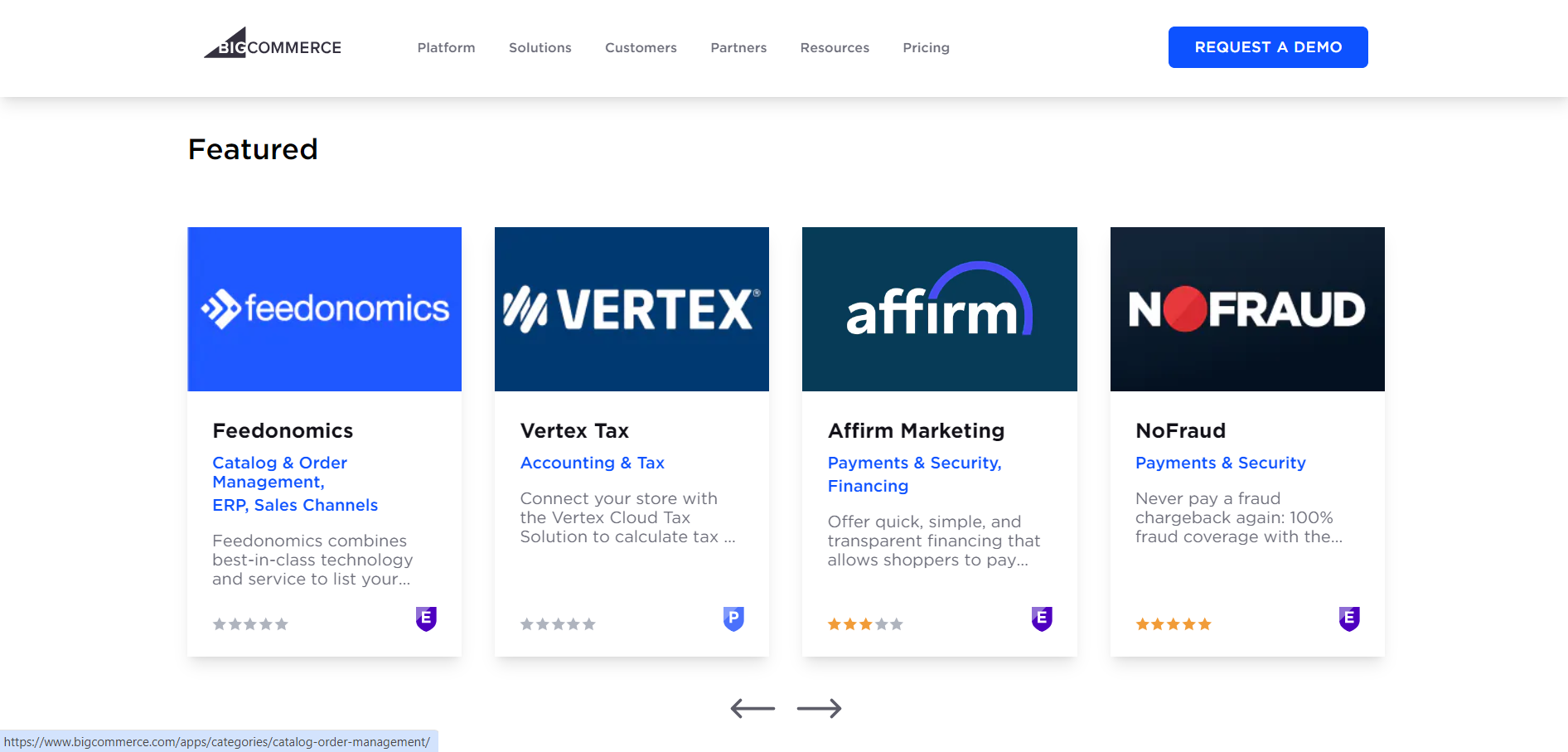
Marketing Features
Design FunctionalitiesRepresents how well each platform allows for creative design and customization of websites.Score Components:
- Template Variety (30%): Range and quality of design templates.
- Customization (30%): Flexibility and options for design alterations.
- User Interface (20%): Ease and intuitiveness of the design process.
- Responsiveness (10%): Adaptability to different devices and screen sizes.
- Innovation (10%): Unique design features and tools.
 7.9
7.9
 7.2
7.2
🏆
Overall Winner: BigCommerce
. BigCommerce edges out Jimdo with a slightly higher score, indicating a more comprehensive set of marketing tools. Both platforms offer a similar range of features, but BigCommerce’s robust ecommerce focus and advanced SEO tools give it the upper hand.

|

|
|
|---|---|---|
|
SEO Tools |
|
|
|
Email Marketing |
|
|
|
Blogging |
|
|
|
Social Media Integration |
|
|
|
Analytics and Reporting |
|
|
|
Ads and Promotions |
|
|
Customer Support
Customer supportEvaluates the quality and availability of support options.Score Components:
- Response time (40%): Speed of support responses.
- Support quality (30%): Effectiveness and helpfulness of the support.
- Availability (20%): Range of support channels (phone, chat, email).
- Resource richness (10%): Quality of self-help and educational materials.
 8.7
8.7
 6.8
6.8
🏆 Winner: BigCommerce
. BigCommerce outperforms Jimdo in this category with a customer support score of 8.7 compared to Jimdo’s 6.8. BigCommerce offers 24/7 customer support through various channels, including phone, email, and live chat, ensuring global accessibility and convenience for users. The company provides dedicated phone lines for several regions and requires a support pin for personalized assistance, catering to customers worldwide. An extensive knowledge base and active community forums supplement these direct support options, allowing users to find answers and share experiences. This multi-faceted support system underscores BigCommerce’s commitment to user satisfaction and problem resolution.
On the other hand, Jimdo offers various customer support channels to cater to users’ needs, including email support, a call center, and social media support via platforms like Facebook, Twitter, and Instagram. However, they do not currently offer live chat support. Users can also find specific request forms for certain issues like password resets and content reports on Jimdo’s help center. Keep in mind that support options may vary based on the user’s plan, so it’s advisable to check Jimdo’s official support pages for the most accurate and current information. However, Jimdo does not offer a specific enterprise plan, which is a disadvantage compared to BigCommerce’s extensive support for enterprise plans.
Security
SecurityLooks at the platforms’ security measures and data protection.Score Components:
- Data protection (40%): Safeguards for user and customer data.
- SSL and encryption (30%): Implementation of secure connections.
- Compliance (20%): Adherence to industry security standards.
- Regular updates (10%): Frequency of security updates and patches.
 8.9
8.9
 8.3
8.3
🏆
Winner: BigCommerce
. BigCommerce takes security seriously, with a comprehensive approach that includes adherence to international regulations like GDPR and CCPA, data encryption, secure data centers, regular security audits, and continuous monitoring. It also provides resources for merchants to follow best practices in security management.
Jimdo also prioritizes security, with measures such as a strong firewall, DDoS protection, HTTPS encryption, and compliance with GDPR. However, BigCommerce’s higher security score and more robust set of security features give it the edge in this comparison.
AI Capabilities
AI capabilitiesMeasures the effectiveness of AI-driven features and tools.Score Components:
- Automation efficiency (40%): Impact of AI on streamlining processes.
- Personalization (30%): AI-driven customization for users or customers.
- AI-Assisted design (20%): Role of AI in website design and functionality.
- Data analysis (10%): Use of AI in interpreting user data and analytics.
 7.3
7.3
 6.0
6.0

|

|
|
|---|---|---|
|
AI Website Builder |
|
Jimdo’s AI website builder offers a range of features for creating a professional online presence |
|
AI Ecommerce Features |
Personalized product recommendations, AI on-site search, and AI powered chatbots |
AI-powered design suggestions for store layouts and image recommendations |
|
AI Content Generation |
AI-powered writing tools for creating product descriptions and SEO metadata |
|
|
Additional AI Features |
AI-powered writing features for product descriptions, personalized storefronts through product recommendations, and AI-driven data analytics |
AI capabilities focused on website creation, with ADI guiding users through the website creation process |
🏆 Winner: BigCommerce
. Despite not having an AI website builder, BigCommerce’s AI capabilities are more comprehensive, with a focus on enhancing ecommerce operations and improving operational efficiency, customer experiences, and sales. Its AI-powered writing tools and data analytics provide valuable tools for merchants.

Jimdo, with a score of 6.0, offers an AI website builder that simplifies the site-building process. However, its AI capabilities are basic and mostly focused on website creation, with limited ecommerce and content generation features.
User Management
User ManagementAssesses the platforms’ capabilities in managing user roles, permissions, and accessibility.Score Components:
- Role Customization (40%): Flexibility in creating and defining user roles and
permissions. - Ease of Management (30%): User interface and tools for managing users.
- Access Control (20%): Effectiveness of access control measures for different user
levels. - Scalability (10%): Ability to manage a growing number of users efficiently.
 8.9
8.9
 5.8
5.8
🏆 Winner: BigCommerce
. BigCommerce and Jimdo offer different approaches to user management.
- BigCommerce allows an unlimited number of staff accounts with various roles and permissions, providing a flexible and comprehensive user management system.
- Jimdo’s user management capabilities depend on the chosen plan. The Free, Start, and Basic Shop Plans allow website management by a single owner. The Grow Shop Plan permits two editors, including the account owner and one collaborator. The Business Plan extends collaboration to five editors, consisting of the account owner and four collaborators. The Unlimited Plan provides unlimited editors, fostering a collaborative team environment. The VIP Plan, designed for online stores, does not specify a limit on editors for websites.
BigCommerce User Roles and Access Levels:
| Role | Description | Access Highlights |
|---|---|---|
| Sales Staff | Enables all Sales Staff permissions | Manage, edit, and add orders, finalize manual orders with manual payments, manage returns, capture funds, and refund orders, manage and edit customers, manage and edit product reviews, manage legacy coupons and promotions, use Image Manager. |
| Sales Manager | Enables all Sales Staff and Sales Manager permissions | Includes Sales Staff permissions, manage, create, edit, and delete products, manage product options and categories, export orders, manage customer store credit and export customers, manage blogs, brands, and various reports, edit inventory and manage channels. |
| Store Administrator | Enables all Sales Staff, Sales Manager, and System Admin permissions | Includes Sales Staff and Sales Manager permissions, manage users and form fields, manage settings, manage payments, shipping, and tax settings, import catalog entities and customers, access store design tools and Page Builder, manage customer groups, take store down for maintenance. |
| Store Owner | Includes all permissions and is the person financially responsible for the account | Full access to all permissions and features across the platform, exclusive access to account-related features and settings not available to other roles. |
| Custom | Use this option to create your own combination of permissions | Customize permissions based on specific needs, mix and match permissions from different roles to create a unique role with tailored access. |
Jimdo does not provide a detailed breakdown of user roles and access levels.
Additional Features

|

|
|
|---|---|---|
|
SSL Certificate |
|
|
|
Custom Domain |
|
|
|
Free Custom Domain Included |
|
|
|
International Domains |
|
|
|
Mobile Responsive |
|
|
|
Page Speed |
|
|
|
Website Builder Mobile App |
|
|
|
Convert a Website To An App |
|
|
|
Website Analytics |
|
|
|
Multilingual Sites |
|
|
|
Multiple Users |
|
|
User Feedback
User feedback on BigCommerce is mixed, with positive remarks on its ease of use, SEO configuration, and strong support team. However, significant criticisms include its lack of suitability for businesses with brick-and-mortar locations, due to issues with POS integration and sales tracking, as well as its inflexibility with customization and additional costs for necessary features. Despite these challenges, some users appreciate the platform’s ability to quickly launch and reliably host stores, alongside its potential for scalability and e-commerce growth.
Jimdo, a website builder platform, also receives mixed reviews from users. Positive feedback highlights its ease of use, no-code editor, and quick website development for basic sites. However, criticisms include outdated design, limited templates, and concerns about pricing transparency. The overall impression suggests Jimdo may suit beginners but could be less ideal for those seeking advanced features or modern designs.
The making of this blog
We followed a clear, step-by-step process to write and research this article.
FAQ
Which platform is better for ecommerce, BigCommerce or Jimdo?
Can I use BigCommerce or Jimdo for a non-ecommerce website?
How do BigCommerce and Jimdo compare in terms of design and customization?
Which platform offers better customer support, BigCommerce or Jimdo?
Are BigCommerce and Jimdo suitable for beginners?
How do the platforms compare in terms of price and value?
Which platform has better hosting quality?
Can I manage multiple users on both platforms?










